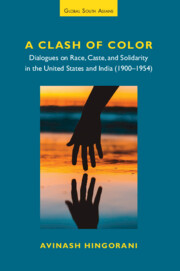 A Clash of Color
A Clash of Color Published online by Cambridge University Press: 28 November 2024
There is only one history – the history of man and I am not against one nation in particular, but against the general idea of all nations.
—Rabindranath TagoreDuring the early twentieth century, Rabindranath Tagore sought to spread his intellectual ideas in a fight against a scientific racist ideology which presented non-White or non-European individuals as downtrodden and in need of European colonialism to civilize them. Tagore was born in 1861 into a prominent Bengali Brahmin family as the youngest of thirteen children. His family was extremely wealthy, mainly due to the success of his grandfather Dwarkanath who had amassed a fortune through his firm, Carr, Tagore and Co. Dwarkanath had earned a great deal of respect from the British for his business accomplishments. From an early age, Tagore was an avid reader. Heavily influenced by the Upanishads, he was inspired to become a writer himself. In his works, Tagore set out to find unity and “a stability of belief and moral principal to give meaning and order to everything he did.”1 He looked for harmony in all things while paying attention to the deep religious beliefs of ancient India. Tagore believed the “unity of God and his creation was the unity of a creative personality.”2 He expressed his creative passions by writing poetry that had strong spiritual messages. His writings referred heavily to the landscape of eastern India where he described the flowers, forests, birds, and the sacred Ganges River. Many of Tagore's poems created a sense of nostalgia. In one of his poems, titled Shah Jahan, named after the Mughal emperor who built the Taj Mahal, Tagore lamented the end of the Mughal Empire, writing, “You are gone now emperor – Your empire has dissolved like a dream, Your throne is shattered, Your armies, whose marching shook the earth, Today have no more weight than the windblown dust on the Delhi road.”3 Tagore believed that the British Raj neglected the histories of the great Indian empires within their schools for Indian pupils. He wanted Indians to be proud of their ancestry, and sought to reassert their cultural brilliance both at home and abroad.
To save this book to your Kindle, first ensure no-reply@cambridge.org is added to your Approved Personal Document E-mail List under your Personal Document Settings on the Manage Your Content and Devices page of your Amazon account. Then enter the ‘name’ part of your Kindle email address below. Find out more about saving to your Kindle.
Note you can select to save to either the @free.kindle.com or @kindle.com variations. ‘@free.kindle.com’ emails are free but can only be saved to your device when it is connected to wi-fi. ‘@kindle.com’ emails can be delivered even when you are not connected to wi-fi, but note that service fees apply.
Find out more about the Kindle Personal Document Service.
To save content items to your account, please confirm that you agree to abide by our usage policies. If this is the first time you use this feature, you will be asked to authorise Cambridge Core to connect with your account. Find out more about saving content to Dropbox.
To save content items to your account, please confirm that you agree to abide by our usage policies. If this is the first time you use this feature, you will be asked to authorise Cambridge Core to connect with your account. Find out more about saving content to Google Drive.